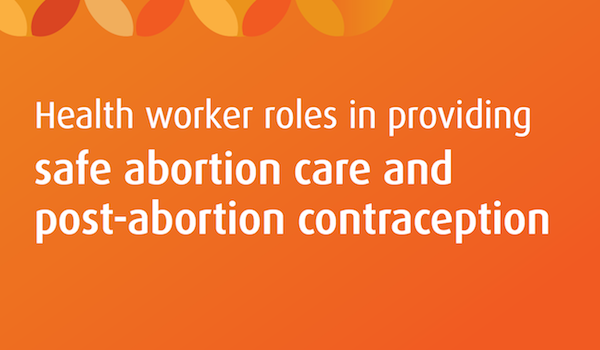
Among the many barriers that limit access to safe abortion care, the lack of trained providers is one of the most critical. It is estimated that the global deficit of skilled health-care professionals will reach 12.9 million by 2035. Such shortages are especially critical in regions of the world that also have a high burden of unsafe abortion and related mortality. Additionally, most countries, including many high-income ones, have subnational disparities in the availability of a skilled health workforce, with shortages being particularly high in rural areas or within the public sector
Although in many contexts abortion-related care provision is limited to specialist doctors, many of the evidence-based interventions for safe abortion and post-abortion care, particularly those in early pregnancy, can be provided on an outpatient basis at the primary care level. The emergence of medical abortion (i.e. non-surgical abortion using medications) as a safe and effective option has resulted in the further simplification of the appropriate standards and health worker skills required for safe abortion provision, making it possible to consider expanding the roles of a much wider range of health workers in the provision of safe abortion.
Recommendations have been made for tasks related to safe abortion care (including post-abortion contraception) and the management of complications of abortion (also known as post-abortion care in some settings and provided as part of emergency obstetric care). Only clinical interventions that have been recommended as safe and effective according to current WHO technical guidance (i.e. Safe abortion: technical and policy guidance for health systems) are included.
The range of types of health workers considered for the various tasks was broad-based and included specialist doctors (obstetrics and gynaecology), doctors not specialized in obstetrics and gynaecology, associate clinicians, midwives, nurses, auxiliary nurses (ANs) and auxiliary nurse midwives (ANMs), doctors of complementary systems of medicine (a significant portion of the workforce in some regions), pharmacists, pharmacy workers and lay health workers.
All of the recommendations assume that the assigned health workers will receive task-specific training prior to implementation. The implementation of these recommendations also requires functioning mechanisms for monitoring, supervision and referral.
The recommendations are applicable in both high- and low-resource settings. They provide a range of options of types of health workers who can perform the specific task safely and effectively. The options are intended to be inclusive and do not imply either a preference for or an exclusion of any particular type of provider. The choice of a specific health worker for a specific task will depend upon the needs and conditions of the local context.
FULL TEXT: Health worker roles in providing safe abortion care and post-abortion contraception
(English, French, Spanish), July 2015 (81 pages): First Prize BMA Medical Award, September 2015



